





Choosing the right influencer marketing software is critical in 2025, as brands increasingly rely on first-party data and automation to scale creator collaborations. While Phyllo has gained attention for offering a data API layer that connects apps to creator-consented data, many users report challenges with integration stability, slow customer support, and limited campaign-level features compared to full-service platforms.
According to a 2025 report by Grand View Research, the global influencer marketing platform market is expected to reach $53.9 billion by 2030, driven by the demand for smarter automation and performance-based campaign tools. This shift signals that brands are moving away from fragmented tools and developer-heavy solutions like Phyllo, and toward integrated platforms that balance power with ease of use.
Here are the top 10 Phyllo alternatives we’ll explore in this article:
Here are four specific reasons why users are actively seeking alternatives to Phyllo:
Phyllo focuses on providing authenticated creator data via API, but it lacks end-to-end campaign management tools that brands and agencies need. There’s no built-in outreach, content approval workflows, or performance tracking — meaning users often need to integrate multiple external tools just to run a single campaign.
Several developers and marketers report issues with Phyllo’s integrations breaking or requiring constant maintenance. Especially when working across multiple creator platforms (like TikTok, Instagram, and YouTube), users note recurring disruptions in data syncing, causing delays and inconsistent insights.
Phyllo is API-first, which means it’s not plug-and-play. Unless you have a tech team to build custom dashboards or connect data pipelines, the tool can be overwhelming and impractical for marketing teams that need immediate usability and results.
A recurring theme on G2 reviews is frustration with Phyllo’s customer support. Users mention delayed responses, lack of proactive troubleshooting, and limited onboarding guidance — especially when urgent bugs or API errors occur during live campaigns.
Our comparison focuses on several key aspects:
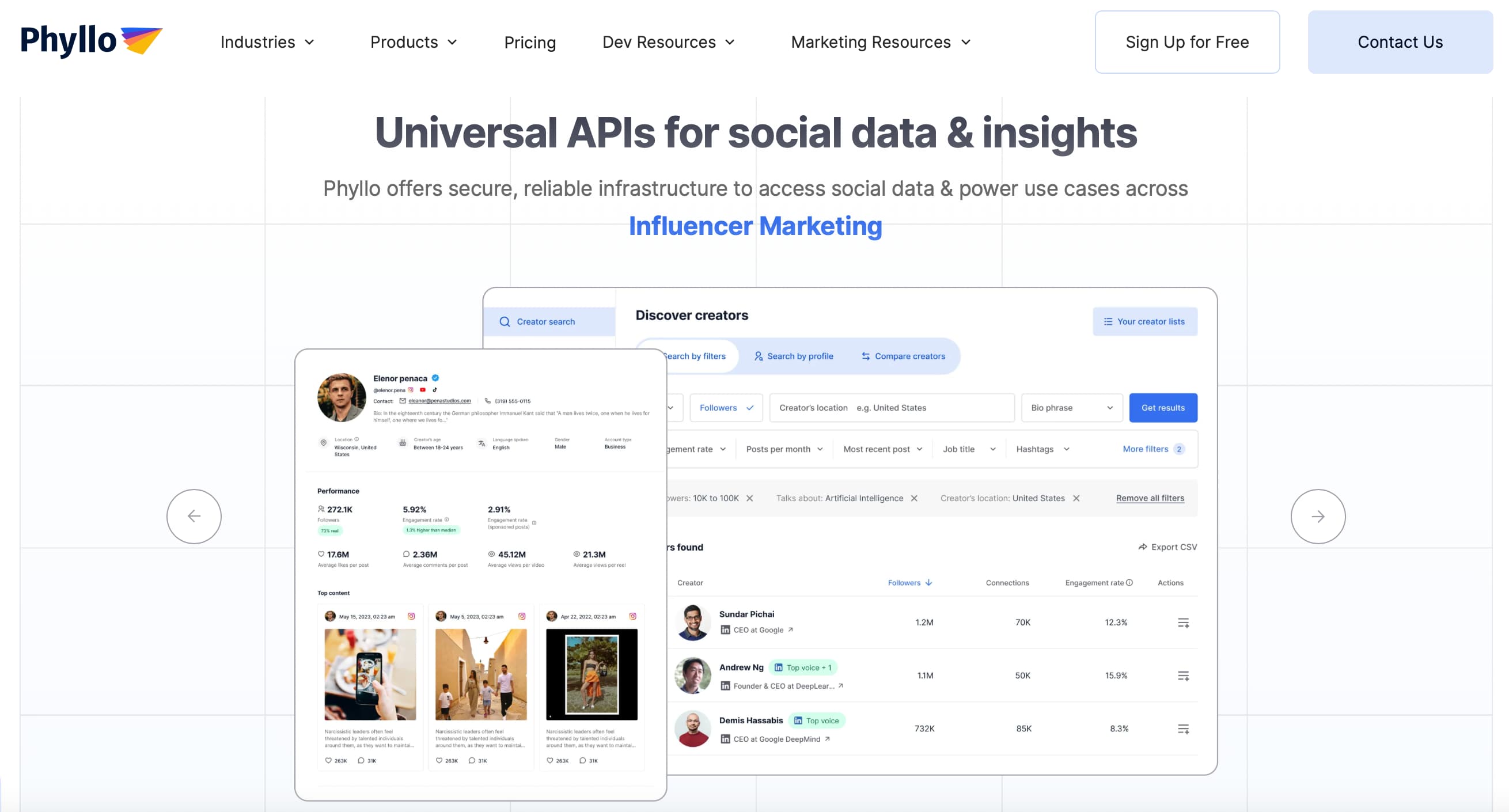
Platform Coverage: Phyllo offers data access for over 400 million creators across Instagram, YouTube, TikTok, LinkedIn, and X (formerly Twitter). It supports profile analytics, campaign tracking, and content exports across these platforms. However, platform-specific insights for Twitch and Twitter are limited, as noted by some users.
Best For: Phyllo is best for tech-enabled brands, agencies, and influencer marketing platforms looking to extract authenticated creator data via API and build custom dashboards or tools.
Pricing: Phyllo offers four pricing tiers:
A free trial with credits is available for new users.
Reviews: 4.5 / 5.0 (G2)
Ease of Use (UX/UI): Users describe Phyllo’s dashboard as clean and functional, especially for users with technical backgrounds. However, non-developers often find the platform unintuitive, especially when trying to run influencer campaigns without engineering support.
Customer Support: Multiple users report slow response times and difficulty resolving API errors quickly. While the team is described as knowledgeable, delays and lack of proactive support have frustrated customers during time-sensitive campaigns.
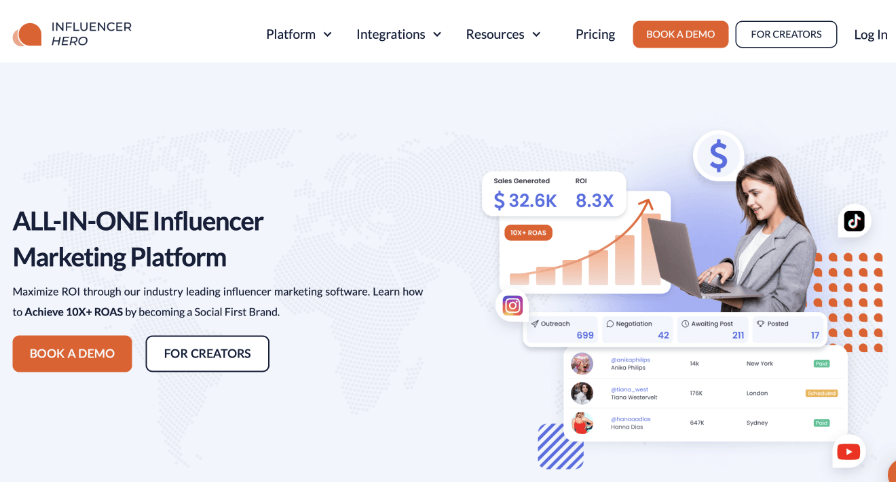
Platform Coverage: Influencer Hero supports 8 major platforms: Instagram, TikTok, YouTube, Facebook, Pinterest, Snapchat, X (Twitter), and Twitch. The platform is built to support full-funnel influencer marketing across all major social channels.
Best For: Influencer Hero is ideal for D2C brands, eCommerce companies, and agencies looking to run large-scale influencer and affiliate campaigns with full control over automation, content, and ROI tracking.
Pricing: Influencer Hero offers flexible monthly plans tailored to different growth stages:
Reviews: 5.0 / 5.0 (Capterra)
Ease of Use (UX/UI): Influencer Hero is praised for its intuitive interface, drag-and-drop campaign structure, and user-friendly dashboards. Built with simplicity in mind, it includes automated workflows, smart filters, and customizable email templates—making campaign setup and execution seamless even for non-technical teams.
Customer Support: Support is one of Influencer Hero’s most acclaimed features. Every plan includes a dedicated account manager from day one, with access to 24/7 real-human live chat, responsive email support, and a comprehensive Help Center with written and video tutorials. Pro plan users also gain access to a private Slack channel for real-time support and strategic consultations.
Phyllo offers a powerful API-first approach for accessing creator-consented data, making it best suited for companies building their own influencer tools. However, it lacks built-in campaign management, outreach automation, and gifting features—forcing users to rely heavily on dev teams and manual workflows.
In contrast, Influencer Hero is an all-in-one solution designed for performance marketers. It provides everything out-of-the-box—from creator discovery and outreach to gifting, storefronts, and affiliate payouts.
With flexible pricing that starts at $649/month and no required annual commitment, Influencer Hero offers far greater functionality and ease of use at a more accessible entry point—making it the stronger choice for brands ready to scale now.
Curious how Influencer Hero can elevate your influencer strategy? Book a free demo today and see how our platform can help you scale discovery, outreach, and performance - all in one place.

Platform Coverage: Traackr supports influencer campaigns across Instagram, TikTok, YouTube, Facebook, Pinterest, X (Twitter), Snapchat, Twitch, and LinkedIn. It provides deep social listening and performance tracking across these platforms with a focus on brand safety and historical performance data.
Best For: Traackr is best for enterprise beauty, fashion, and lifestyle brands that prioritize data-driven decision-making and need global campaign visibility and influencer spend tracking at scale.
Pricing: Traackr offers custom plans with pricing typically starting at $32,500/year. All plans are billed annually and tailored based on user needs, regions, and volume of creators managed.
Reviews: 4.3 / 5.0 (G2)
Ease of Use (UX/UI): Traackr is often praised for its clean dashboard and strong filtering options, especially when managing international or multi-market campaigns. However, some users mention a learning curve due to its data-rich interface and terminology.
Customer Support: Users report responsive support and helpful onboarding, especially for larger enterprise clients. While the platform does not include live chat, dedicated customer success managers and regular check-ins help brands maximize value from the tool.
Phyllo is best suited for developer teams and influencer platforms looking to build on top of authenticated creator data. Its pricing starts at $199/month and scales based on API usage, offering a flexible and affordable entry point for tech-savvy teams. However, it lacks campaign execution tools, reporting dashboards, and a user-friendly interface, making it less viable for marketing teams that need an out-of-the-box solution.
In contrast, Traackr is built for enterprise brands managing global influencer campaigns with a strong focus on ROI, brand safety, and historical performance. It comes at a significantly higher cost, with plans starting at $32,500/year, and requires an annual contract.
While it doesn’t offer outreach or gifting, it delivers far more in terms of strategic insights, spend benchmarking, and campaign reporting—making it a better fit for large, data-driven marketing teams that prioritize control and visibility over manual execution.
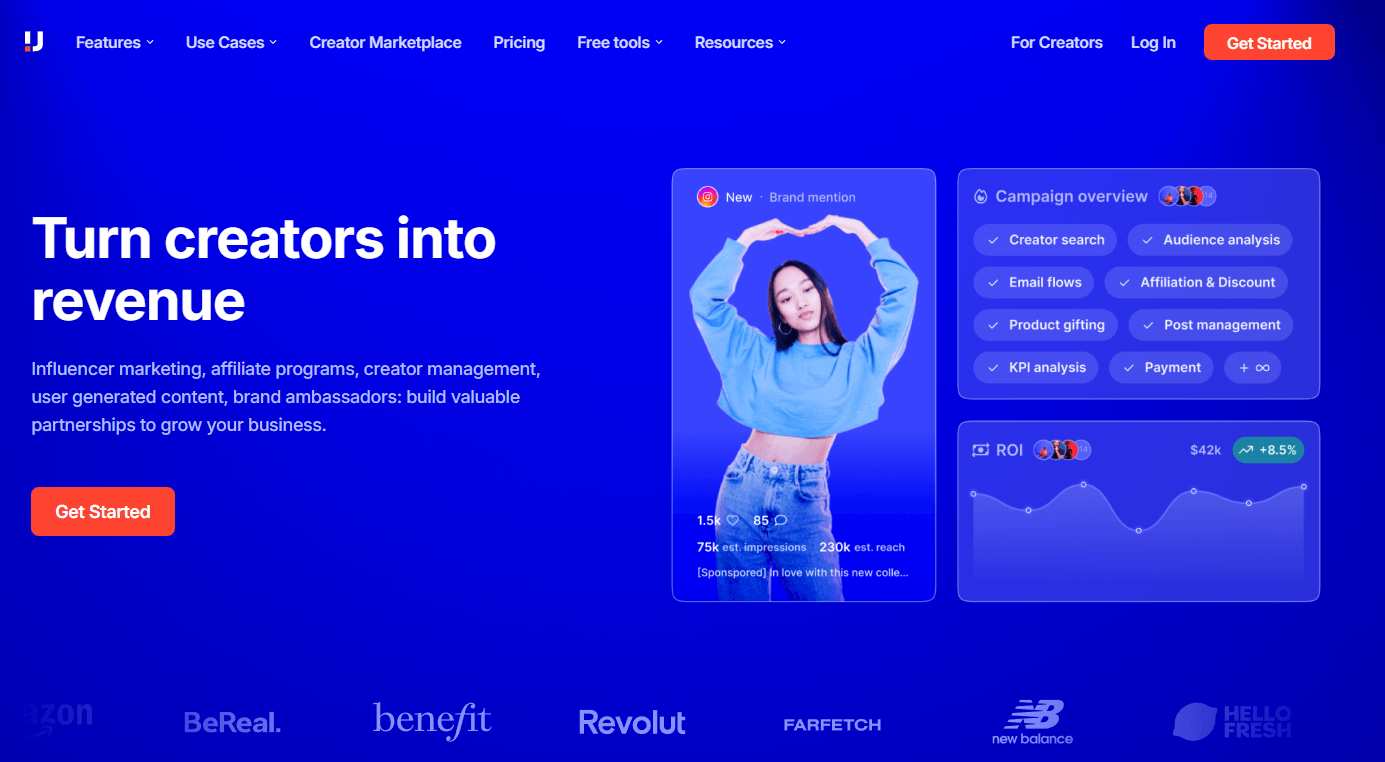
Platform Coverage: Upfluence supports influencer discovery and campaign management across Instagram, TikTok, YouTube, X (Twitter), Twitch, Pinterest, and WordPress blogs. It also includes robust integrations with Shopify and Amazon, allowing eCommerce brands to track performance and ROI directly within the platform.
Best For: Upfluence is ideal for eCommerce brands—especially those selling through Shopify or Amazon—who want to scale influencer campaigns while leveraging customer data, tracking affiliate sales, and managing gifting and payments in one place.
Pricing: Upfluence offers an annual plan billed monthly starting at $1,276/month.
Reviews: 4.3 / 5.0 (Capterra)
Ease of Use (UX/UI): Users appreciate the clean dashboard and powerful filtering tools, especially for influencer search and campaign tracking. While robust in features, some report a learning curve during onboarding due to the depth of functionality, particularly around advanced outreach and Shopify integrations.
Customer Support: Support is described as responsive and knowledgeable, with access to onboarding sessions and helpful walkthroughs. However, some users mention that platform complexity can slow down initial setup without direct support or experience managing affiliate programs.
Phyllo and Upfluence serve fundamentally different use cases. Phyllo is a data API platform built for developers who want to build custom influencer tools—it offers flexible pricing starting at $199/month, but lacks native tools for outreach, CRM, gifting, or content tracking. It’s ideal for tech teams, but not for marketers looking for a plug-and-play solution.
In contrast, Upfluence is a full-service influencer marketing platform, designed for eCommerce brands that want to manage the entire campaign lifecycle—from discovery to content repurposing and payments. With pricing starting at $1,276/month (annual contract), it’s significantly more expensive than Phyllo, but it removes the need for any external tools or developer support.
For brands looking to scale fast and track ROI through Shopify or Amazon, Upfluence is the more complete, marketing-ready solution.

Platform Coverage: Captiv8 offers influencer marketing support across Instagram, TikTok, YouTube, Facebook, X (Twitter), Snapchat,and Twitch. It includes integrations with Shopify and Refersion, but lacks native support for platforms like Amazon or WooCommerce.
Best For: Captiv8 is best suited for enterprise brands and agencies running large-scale influencer campaigns that need collaborative workflows, advanced campaign tracking, and competitive benchmarking tools.
Pricing: Captiv8 requires an annual commitment starting at $25,000/year, plus a $3,000 one-time onboarding fee.
Reviews: 4.2 / 5.0 (G2)
Ease of Use (UX/UI): Users praise Captiv8's filtering power and reporting customization, including drag-and-drop dashboards and reusable filters. However, its complexity and feature depth make it more appropriate for seasoned marketing teams than beginners or smaller companies.
Customer Support: Customer support has been frequently criticized. Users report delayed responses, unresolved issues, and lack of proactive troubleshooting — both from the brand and creator side of the platform.
Phyllo and Captiv8 target very different audiences. Phyllo is API-first, ideal for companies building custom influencer tools using creator-permissioned data. It starts at just $199/month, but lacks full campaign workflows, outreach tools, or analytics dashboards—making it best for developer teams, not marketers.
Captiv8, on the other hand, is a comprehensive enterprise platform focused on discovery, performance tracking, and collaboration. However, it comes with a steep price tag — starting at $25,000/year plus onboarding fees, and up to $30,000/month for affiliate storefront features.
While Captiv8 offers advanced reporting and competitive intelligence, its lack of flexibility in pricing, frequent customer service complaints, and limited eCommerce integrations make it less suitable for smaller or scaling teams.

Platform Coverage: CreatorIQ supports influencer marketing across Instagram, TikTok, YouTube, Facebook, Pinterest, Twitch, and X (Twitter). It offers robust global data coverage (excluding certain Chinese regions) and integrates directly with platforms through official APIs for real-time, compliant data.
Best For: CreatorIQ is best for large enterprises and global brands looking for a data-compliant, all-in-one platform to manage complex influencer campaigns at scale—with advanced reporting, CRM, and strategic support included.
Pricing: CreatorIQ offers annual contracts only, with four core tiers:
Reviews: 4.4 / 5.0 (Capterra)
Ease of Use (UX/UI): Users find the platform feature-rich yet user-friendly, with clean dashboards, advanced filtering, and live reports. Some note that while there’s a lot to explore, the onboarding and intuitive UI make it manageable for both small and large teams.
Customer Support: CreatorIQ is praised for its hands-on strategic support, including a dedicated implementation manager, a customer success manager, and quarterly planning sessions. Their team is described as “an extension of your team,” offering campaign guidance and regular performance reviews.
Phyllo and CreatorIQ serve very different user needs. Phyllo is a developer-first solution that offers creator-consented data via APIs starting at $199/month, but lacks campaign management, outreach tools, or UI-friendly dashboards. It’s better suited for product teams or companies building custom influencer solutions in-house.
By contrast, CreatorIQ is a full-scale enterprise platform, ideal for large marketing teams managing multi-market influencer strategies. With prices starting at $35,000/year and going up to $200,000/year, it’s a premium solution that includes CRM, gifting, payments, reporting, and strategic support.
For brands needing enterprise-grade compliance, creator vetting, and integrated analytics, CreatorIQ is the more powerful (but costlier) option.

Platform Coverage: HypeAuditor supports influencer analytics and campaign management across Instagram, TikTok, YouTube, Twitch, Snapchat, and X (formerly Twitter). It’s particularly strong in influencer auditing, with real-time data and fraud detection built into each platform.
Best For: HypeAuditor is best for performance-driven brands and agencies that prioritize data accuracy, influencer vetting, and audience authenticity when running influencer campaigns across social media.
Pricing: HypeAuditor offers customized plans based on usage:
Reviews: 4.3 / 5.0 (G2)
Ease of Use (UX/UI): Users say the platform is feature-rich and data-first, with powerful filters and customizable reports. However, it can feel overwhelming at first for beginners and may require onboarding to take full advantage of the tool’s capabilities.
Customer Support: HypeAuditor receives praise for custom onboarding and responsive support, especially during setup and trial periods. All plans include access to technical and customer success teams, with guided campaign support as needed.
Phyllo and HypeAuditor serve very different roles in the influencer ecosystem. Phyllo is an API-first platform built for dev teams looking to access creator-consented data for custom tools, with pricing starting at $199/month. While flexible and scalable, Phyllo lacks outreach tools, campaign dashboards, or eCommerce tracking—making it less suitable for brands looking for turnkey campaign execution.
HypeAuditor, in contrast, is a data-rich influencer marketing platform that offers everything from discovery and fraud detection to campaign tracking and outreach. Its standard plans start at ~$10,000/year, which includes robust search, influencer reports, and CRM tools.
For brands focused on authenticity, detailed analytics, and AI-powered insights, HypeAuditor is a far more comprehensive and accessible option—especially for those without a tech team.

Platform Coverage: Instagram, TikTok, YouTube, X (Twitter), Twitch, Snapchat.
Best For: GRIN is best suited for DTC and eCommerce brands that need a robust, all-in-one platform to manage influencer relationships, gifting, affiliate payments, and UGC collection at scale.
Pricing: Pricing starts at $25,000/year, with monthly payments available. GRIN typically requires a 12-month minimum commitment, and pricing can vary based on features and usage volume. Some users report that pricing transparency could be improved during the sales process.
Reviews: 4.5 / 5.0 (G2)
Ease of Use (UX/UI): GRIN is known for its organized, all-in-one campaign dashboard, but some users find the UX inconsistent - especially around search features and slow-loading pages. While the content library and creator portals are user-friendly, others mention a learning curve and occasional lags or glitches during use.
Customer Support: Support feedback is mixed. Many users praise the availability of onboarding strategists and Slack channels for quick assistance, while others report unresolved tickets, delayed replies, and challenges when canceling or troubleshooting bugs.
Phyllo positions itself as an API-first solution that enables secure access to creator data, while GRIN delivers a full-stack influencer marketing platform designed specifically for eCommerce.
Unlike Phyllo, GRIN handles the entire influencer lifecycle—from discovery and gifting to payments and content storage—within a single interface. Phyllo’s strength lies in backend integrations and compliance for developer-heavy teams, whereas GRIN is tailored to hands-on marketing execution.
When it comes to pricing, Phyllo offers more flexible pay-as-you-grow options, whereas GRIN has a higher entry point starting at $25,000/year, which may not be feasible for small to midsize teams.
However, for brands that rely heavily on Shopify or WooCommerce and need extensive gifting, UGC, and affiliate tools, GRIN offers deeper automation and ROI tracking that surpasses what Phyllo can provide out of the box.
Discover: Influencer Hero Vs Grin: Cost Effective Alternative
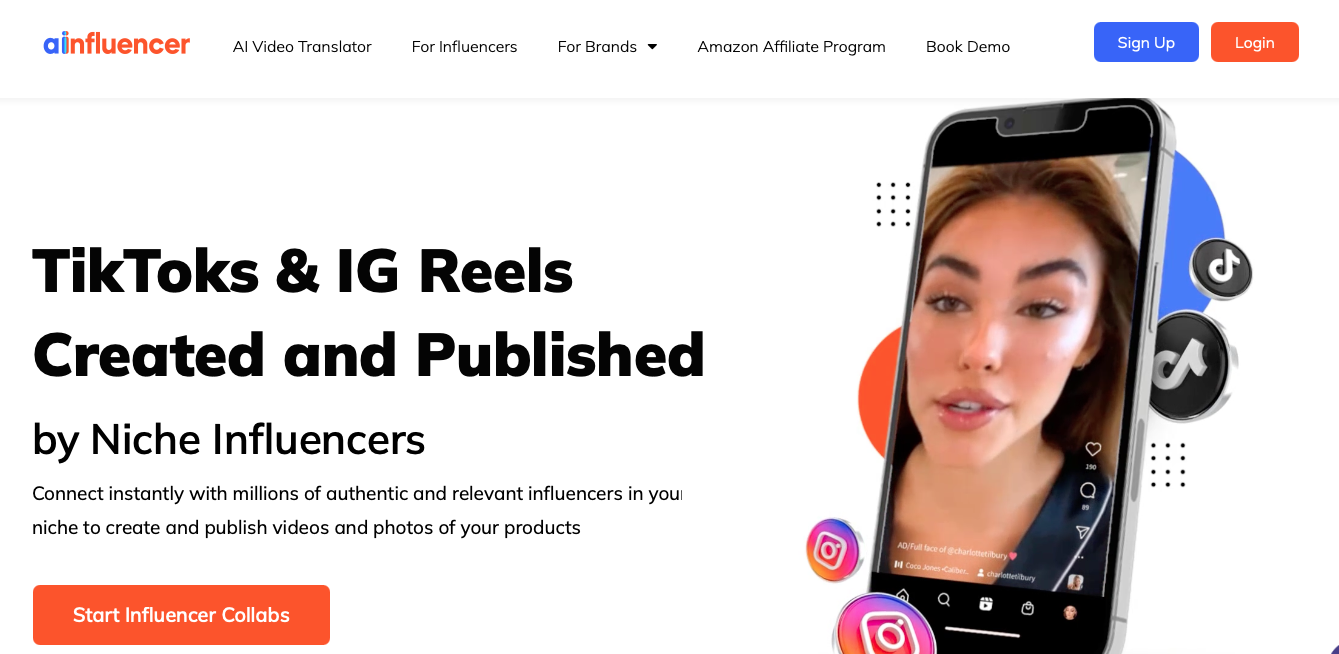
Platform Coverage: Instagram, TikTok.
Best For: AInfluencer is ideal for small to mid-size eCommerce brands or startups looking for a free or low-cost influencer marketplace to run campaigns on Instagram and TikTok - either self-service or fully managed.
Pricing: AInfluencer offers a free-to-use self-service platform with no software fees. Influencer payments start from $10. For managed campaigns, tiered packages include:
Reviews: 4.5 / 5.0 on G2.
Ease of Use (UX/UI): Users appreciate the intuitive layout of the campaign builder and mobile-friendly marketplace, especially for creators. The Chrome extension simplifies outreach directly from Instagram. However, the backend interface can feel limited due to basic analytics and lack of robust search filters.
Customer Support: Brands running managed campaigns receive support from AInfluencer’s internal team via email, WhatsApp, or platform messaging. Some users mention prompt onboarding and helpful follow-up, while others note minimal documentation and limited real-time chat support for free users.
Phyllo and AInfluencer serve fundamentally different segments of the influencer marketing ecosystem. Phyllo is primarily an API infrastructure tool built for platforms and developers looking to access creators’ authenticated data (like insights and earnings). On the other hand, AInfluencer is a plug-and-play influencer marketplace designed for brands to run full campaigns—either through its self-serve platform or via managed services.
In terms of pricing, AInfluencer has a clear advantage for smaller brands or those testing influencer marketing, offering a completely free self-service model and tiered campaign management packages. Phyllo, while more flexible for custom integrations, doesn’t provide campaign execution tools out-of-the-box.
For marketers who prioritize ease of use, low cost, and campaign execution on Instagram and TikTok, AInfluencer offers a lightweight, budget-friendly alternative to Phyllo’s API-first approach.
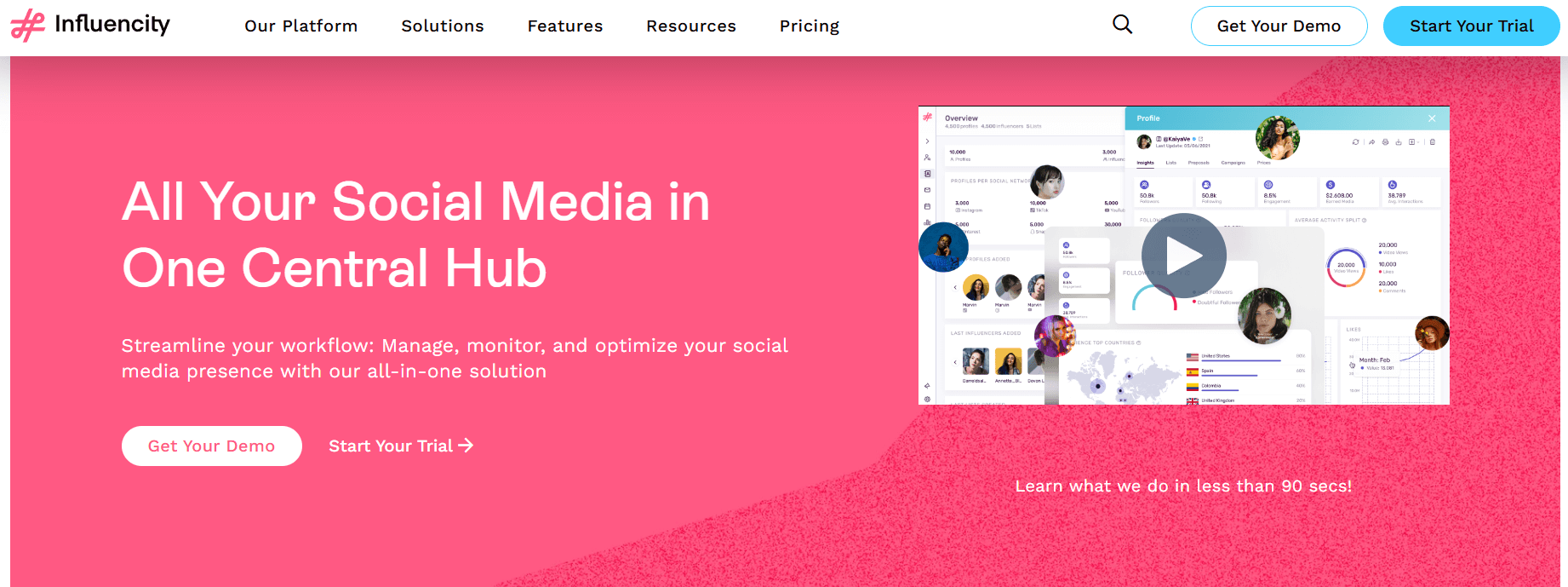
Platform Coverage: Instagram, TikTok, YouTube, and Twitter (analytics only).
Best For: Best for DTC brands and influencer marketing teams seeking an end-to-end solution built on public data—ideal for those wanting to manage discovery, gifting, CRM, and campaign tracking without relying on creator authentication.
Pricing:
Reviews: 4.6 / 5.0 (G2)
Ease of Use (UX/UI): Influencity is praised for its intuitive CRM, Kanban-style campaign boards, and clean dashboard design. Users mention a slight learning curve during onboarding, but once set up, the flow becomes smooth and logical. Many appreciate the ability to visually segment and tag creators in lists and pipelines.
Customer Support: Support is generally considered reliable, especially for Business plan users. Some reviewers mention slower response times for technical issues and during onboarding. There’s a Help Center and onboarding guidance available, but no 24/7 live chat support.
Phyllo is geared toward product teams and platforms that need verified creator data through API integrations, ideal for apps and tech-enabled businesses. However, it lacks core features like campaign execution, CRM, and analytics dashboards—making it a backend solution rather than a standalone tool for marketers.
Influencity, on the other hand, offers a full self-serve suite with campaign tracking, influencer outreach, and Shopify integration, powered by public data—no creator authentication needed.
Its pricing starts at $3,816/year, while Phyllo’s is API-based and usage-dependent. For teams looking to actively run influencer campaigns without engineering support, Influencity is a better fit out of the box.
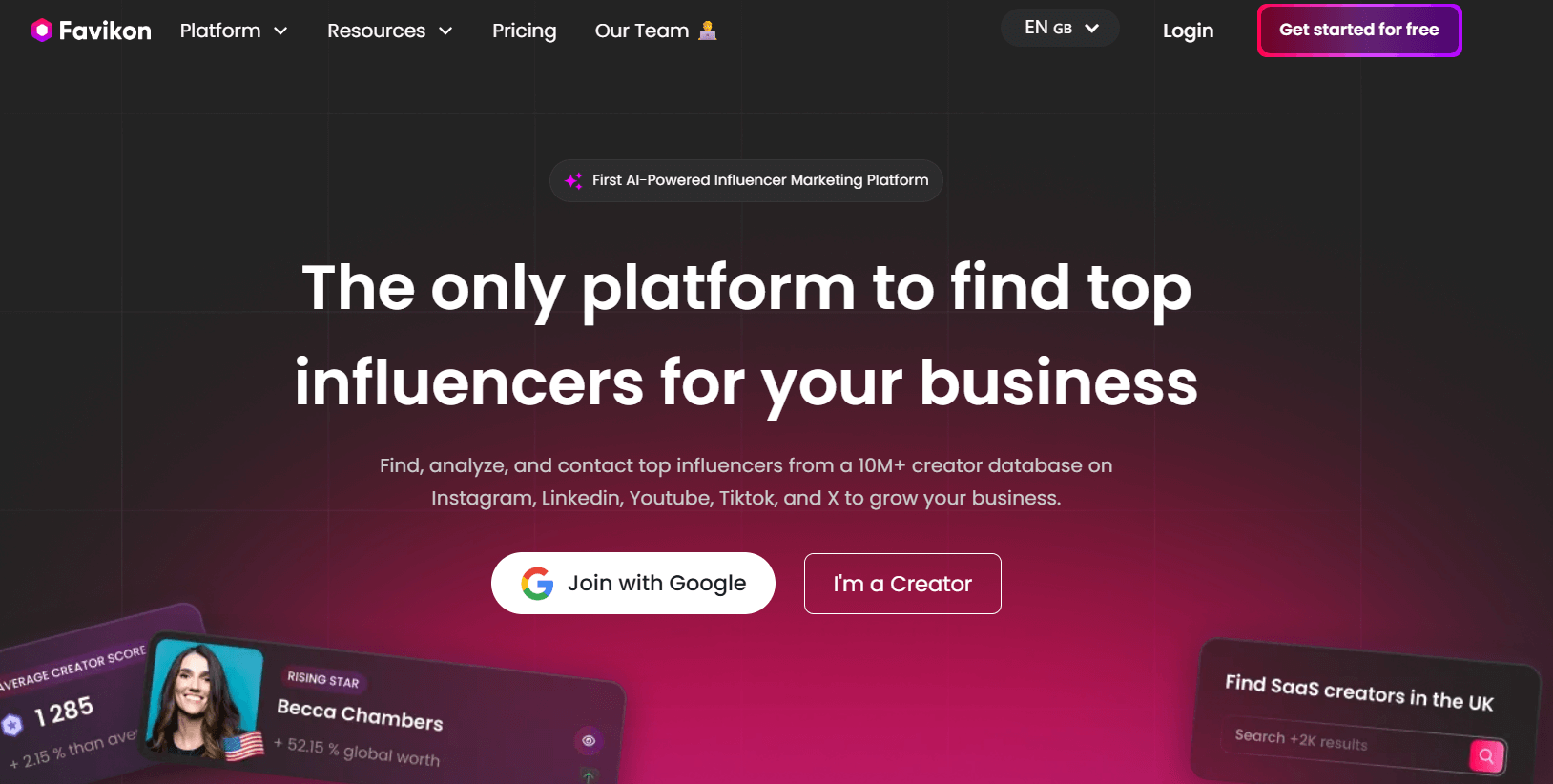
Platform Coverage: Favikon supports Instagram, TikTok, LinkedIn, Twitter (X), and YouTube, with particular strength in B2B creators on LinkedIn and Twitter.
Best For: Favikon is best for B2B brands and agencies looking to discover thought leaders and niche creators on platforms like LinkedIn and Twitter. It’s also ideal for startups looking to monitor personal branding and micro-influencers.
Pricing: Favikon offers three pricing tiers:
Reviews: 4.5 / 5.0 rating (G2)
Ease of Use (UX/UI): Users often highlight Favikon's modern and intuitive interface, with an easy-to-navigate dashboard and slick design. Search tools are simple to use, even for beginners, and the visual reports make performance analysis straightforward.
Customer Support: Favikon is known for fast and friendly support, often responding to queries within a few hours. While they don’t offer 24/7 live chat, users have mentioned that their onboarding sessions and help documentation are effective and helpful.
While both Phyllo and Favikon offer influencer data solutions, their core approaches differ significantly. Phyllo is a data API layer built for developers who want to pull real-time creator data into their own systems or apps. Favikon, by contrast, is a user-facing platform designed for marketers—especially in B2B—who need a simple tool to discover and assess creator credibility, particularly on LinkedIn and Twitter.
In terms of pricing, Favikon stands out for its low entry point and monthly billing flexibility, while Phyllo typically involves a custom quote based on API usage and requires integration work.
If you’re looking for plug-and-play influencer discovery with strong creator scoring and competitive benchmarking in the B2B space, Favikon is a clear winner. Phyllo might be more suitable for tech teams building influencer tools from scratch.
Choosing the right influencer marketing platform depends on your specific needs - whether you're a fast-growing D2C brand, a B2B startup, or an agency juggling multiple campaigns. While Phyllo is strong on backend data infrastructure, many marketers are looking for out-of-the-box solutions with built-in discovery, outreach, and analytics capabilities.
Platforms like Influencer Hero offer a true all-in-one solution with robust features like creator storefronts, affiliate payments, gifting workflows, and a best-in-class CRM.
If you're looking for a user-friendly tool to manage every part of your influencer marketing funnel - without engineering support - Influencer Hero is one of the most comprehensive and scalable alternatives available in 2025.

If you're looking for alternatives to Phyllo that offer more than just data APIs, top options include Influencer Hero, Grin, Upfluence, and CreatorIQ. Unlike Phyllo, which is developer-focused, these platforms are designed for marketers with built-in tools for influencer discovery, outreach, campaign tracking, and affiliate management. Influencer Hero, in particular, stands out for its all-in-one approach, intuitive interface, and flexible pricing, making it ideal for brands and agencies alike.
While Phyllo excels as a data infrastructure solution for developers, it lacks built-in campaign management tools, creator outreach features, and gifting or storefront capabilities. Brands and marketers who want a complete influencer marketing solution without building their own system often turn to tools like Influencer Hero, Traackr, or Captiv8. These platforms provide a more plug-and-play experience with features like AI-powered outreach, real-time reporting, and UGC content tracking.
Yes. Tools like Influencer Hero offer a no-code, ready-to-use experience with guided onboarding and live support. Unlike Phyllo, which requires API integration and developer resources, Influencer Hero includes prebuilt campaign flows, outreach templates, and an easy-to-navigate dashboard—making it ideal for teams without engineering support.
For small to mid-sized eCommerce brands—especially those on Shopify or Amazon—Influencer Hero is one of the most popular choices. It offers built-in support for gifting campaigns, affiliate payments, creator storefronts, and analytics in a single platform. Plus, the pricing is more flexible compared to enterprise-level tools like CreatorIQ or GRIN.
Phyllo typically operates on a custom pricing model based on API usage, which can become costly for scale. In contrast, platforms like Influencer Hero provide transparent pricing across different plans (starting at $0/month with a success-based fee) and include a full suite of features—discovery, CRM, analytics, UGC



Schedule a Demo with one of our media experts below.